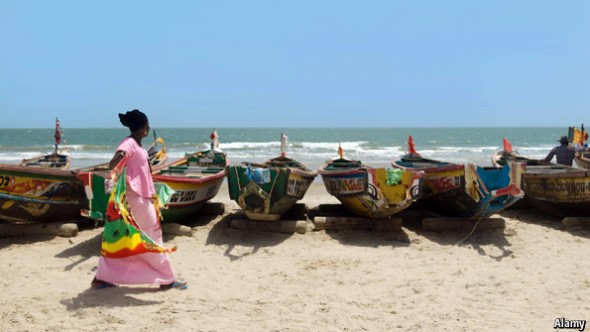Senegal’s Casamance region: The next hot place to go on hols?
Posted: May 7, 2014 Filed under: Senegal | Tags: Casamance, ceasefire, Dakar, Macky Sall, MFDC, Movement of Democratic Forces of Casamance, Salif Sadio, Senegal Leave a commentA ceasefire gives hope to a violent and neglected part of the country
ITS travel-brochure beaches, endless tracts of mangrove and lagoon, and a sedentary pace of life once made Casamance an understated tourist destination. Then rebellion and banditry turned this slim spit of land, which belongs to Senegal but is sandwiched between Gambia and Guinea Bissau, into yet another west African troublespot. Since 1982 an insurgency has flared with varying intensity, most notably between 1993 and 1998 when fighting left over 1,000 people dead. Instead of securing the region’s independence, violence has left it isolated and underdeveloped.
Now this phase of Casamance’s history may be drawing to an end. On April 30, Salif Sadio, the most prominent and hardline of the rebel Movement of Democratic Forces of Casamance (MFDC) leaders, told local media that he was declaring a unilateral ceasefire following talks with President Macky Sall’s government. Although there has been little violence to speak of in Casamace recently (11 deminers were kidnapped in May last year but subsequently released) the gesture is Mr Sadio’s way of formalizing negotiations with Mr Sall. It is also a quid pro quo for the government’s decision to drop an arrest warrant against him.
The rebels’ rallying cry has long been “independence or nothing” but locals reckon that Mr Sadio finally wants to swap the rebel underground for mainstream politics. To this end he has been carefully polishing his image, donating money to a local hospital and holding town hall meetings to update Casamance people on the peace talks. Other high-ups in the factioanlised MFDC may be making their own pronouncements on the viability of peace (one recently demanded a greater role for the United States as an honest broker), but it is Mr Sadio the government has seen fit to deal with.
For his part, Mr Sall wil be glad to milk any good news ahead of local elections in June when opposition candidates are expected to criticise high unemployment figures. The president made ending the Casamance conflict a prominent part of his 2012 election platform, when he proposed “a sort of Marshall Plan” for the region. To date he has secured $40m from the World Bank to boost local rice and mango cultivation, create jobs and repair roads. Much like President Alassane Ouattara in Ivory Coast (though on a somewhat smaller scale), Mr Sall is betting that a rising tide of prosperity will encourage unruly citizens to forget their political beef with the government. Mr Sadio’s ceasefire is the clearest sign so far that this policy is working.
